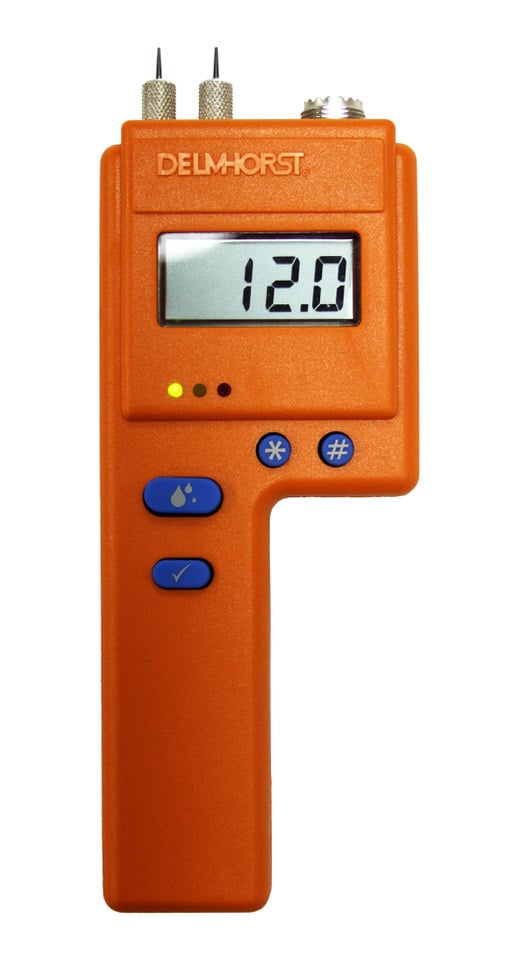Moisture Meter Reviews: Comparing the most effective Versions for Professional and DIY Use
Moisture Meter Reviews: Comparing the most effective Versions for Professional and DIY Use
Blog Article
The Ultimate Guide to Moisture Meters: A Comprehensive Introduction and How They Can Save You Money
In the world of building upkeep, building, and numerous industries, the importance of precisely measuring dampness degrees can not be overstated. Wetness meters act as vital devices in finding and checking moisture material in materials, helping in preventing pricey damages and making certain the high quality of items. Understanding the subtleties of different kinds of dampness meters, their applications, and the potential cost-saving advantages they provide can be a game-changer for businesses and specialists alike. Discovering exactly how these tools can not only enhance procedures however also contribute to economic savings is a journey worth getting started on.
Kinds of Wetness Meters
Various types of moisture meters are offered for different applications in numerous industries. One common type is the pin-type moisture meter, which measures the electrical resistance between two pins inserted into a material. This type is suitable for wood, drywall, and other building materials. Pinless dampness meters, on the various other hand, usage electro-magnetic sensing unit plates to check a bigger location without triggering damage to the material's surface. Moisture Meter. These meters are suitable for swiftly analyzing moisture degrees in huge areas such as floorings and walls.

Furthermore, there are additionally specialized moisture meters made for details materials like soil, grain, or hay. These meters provide exact dampness analyses tailored to the unique buildings of the product being checked. Infrared wetness meters determine the thermal homes of a material to determine its moisture content non-invasively, making them useful for applications where pin or pinless meters may not be suitable. Recognizing the different kinds of moisture meters readily available can assist sectors pick the most proper tool for their details wetness measurement requirements.

Benefits of Using Dampness Meters
Dampness meters provide very useful advantages in accurately examining and keeping an eye on dampness levels in varied products and settings (Moisture Meter). Among the primary advantages of using dampness meters is the prevention of prospective damages triggered by excess dampness. By detecting and dealing with high wetness levels beforehand, dampness meters aid to prevent mold growth, rot, and structural damage in structures, conserving both money and time on repairs. Additionally, moisture meters help in making certain the top quality of products throughout building and construction or production processes. By precisely measuring moisture content, these devices aid keep the stability of wood, drywall, concrete, and other materials, lowering the threat of failures or problems.
Moreover, utilizing dampness meters can lead to raised power performance. In farming setups, wetness meters play an essential duty in optimizing plant returns by allowing farmers to monitor soil wetness degrees and make informed irrigation decisions.
Just How to Pick the Right Moisture Meter
When choosing a dampness meter, it's essential to make certain that the meter is appropriate for the details product you will certainly be screening. Different materials have differing electric homes that can get more impact wetness readings, so selecting a meter designed for your product is essential for precise results. By thoroughly examining these aspects, you can select a wetness meter that fulfills your needs and offers precise wetness measurements for your projects.
Proper Techniques for Moisture Meter Use

Cost Cost Savings With Moisture Meter Applications
Exactly how can the calculated application of wetness meters result in considerable price savings across various industries? Moisture meters play an important function in price savings by protecting against possible damage and making sure high quality control in various industries. In the agriculture sector, wetness meters aid in establishing the ideal time for harvesting plants, stopping over-drying or excess moisture that can affect the final item's high quality. This precise surveillance assists farmers avoid unneeded losses and maximize their return.
In a similar way, in building, moisture meters aid stop costly problems by finding wetness degrees in building materials, such as timber or concrete, which visit this web-site can bring about structural issues otherwise attended to without delay. By determining trouble areas at an early stage, professionals can take corrective measures to avoid comprehensive repair services or replacements, inevitably saving money and time.
Furthermore, in the food processing industry, dampness meters are important for keeping track of item quality and ensuring conformity with security policies. By properly determining dampness content in foodstuff, manufacturers can protect against putridity, keep quality, and minimize waste, resulting in significant price savings. Overall, the tactical application of moisture meters is a valuable financial investment that can lead to significant cost reductions and enhanced efficiency across numerous industries.
Verdict
In conclusion, dampness meters are important devices for finding and measuring dampness levels in numerous materials. By making use of the best dampness meter and complying with proper methods, users can successfully avoid pricey damages created by excess wetness.
Dampness meters serve as indispensable devices in spotting and keeping track of moisture content in products, helping in preventing costly problems More Help and guaranteeing the top quality of items. Infrared dampness meters gauge the thermal buildings of a product to identify its moisture web content non-invasively, making them valuable for applications where pin or pinless meters might not be appropriate.Wetness meters supply very useful advantages in accurately checking and analyzing moisture levels in varied products and settings. In agricultural setups, moisture meters play a crucial role in maximizing plant returns by enabling farmers to monitor dirt dampness levels and make notified watering decisions.In final thought, dampness meters are useful devices for measuring and discovering dampness levels in different products.
Report this page